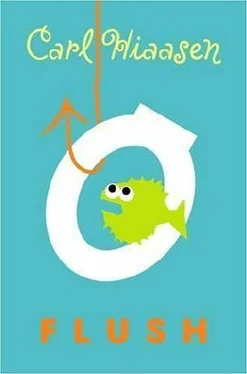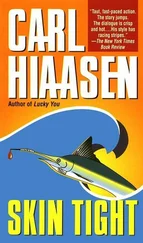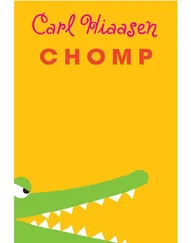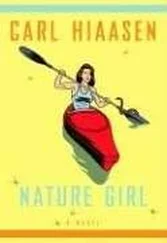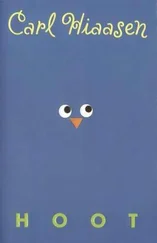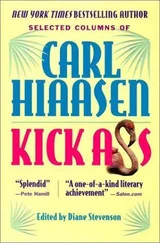“Don't know.”
“Noah, why are you slowing us down?” she shouted.
“I'm not,” I said. “Not on purpose, anyway.”
But the little boat was definitely losing speed. The loud noise that Abbey and I had heard was the outboard engine throwing a piston rod, though we didn't know that at the time.
The motor conked out with a sickly rattle.
I knew we were in major trouble, but I went through the motions of removing the cowling and fiddling with the spark-plug connections. It didn't fool Abbey for a second.
“I don't suppose you brought Dad's toolbox,” she said.
“Very funny.”
I tried to pull the starter cord, but it wouldn't budge. The old Evinrude was stone dead.
A heavy, tired silence fell over us. Once again the little boat was at the mercy of the breeze, which was taking us out to sea, toward the Straits of Florida. Obviously our good luck had run out.
“We're history,” my sister said. “Mom and Dad'll go postal when they get home and we're not there.”
The wind was clocking around to the northwest. In summer that usually means bad weather is on the way.
I said, “Better toss the anchor-no, wait a second…”
Too late. My stomach clenched when I heard the splash.
“Let me guess,” Abbey said. “The rope wasn't tied on, was it?”
“My fault. I should've checked.”
“So I just threw our anchor away. How nice.” She sighed in discouragement. “Now what?”
We saw a distant flash of electric blue, which was followed by a slow deep rumble.
“Seven miles. Not good,” Abbey said.
Dad had taught us how to count the seconds between the lightning bolt and thunder-one thousand, two thousand, three thousand-to figure out how many miles away a storm was. Like Abbey, I'd counted seven.
“Maybe it'll miss us,” she said.
“Yeah.” And maybe someday monkeys will fly helicopters, I thought.
In a few short minutes our mood had plunged from the highest high to the lowest low. The moon slipped behind a rolling gray carpet of clouds, and the freshening gusts smelled wet. Abbey scrunched low in the bow while I hunkered between the seats.
The lightning got brighter and the thunder got louder, but all we could do was brace for it. Rado's dinghy had no oars, and we were already too far from shore to swim-not that either of us was eager to jump in. I remembered Dad saying that you always stay with a boat as long as it's still floating, because a boat is easier than a body for searchers to find.
Soon the wind began to hum, slapping us with sheets of cool rain.
“You all right?” I asked my sister.
“Snug as a bug,” she said.
The little boat slopped across the crests of the waves, moving farther and farther from shore. Stabs of lightning turned the dark into daylight, and I'd catch brief glimpses of Abbey, covering her face with the backpack. I felt horrible for getting us into such a mess, and I was furious at myself for letting her come along. It was one of the all-time dumbest things I'd ever done.
The wind-whipped raindrops stung our skin, and every thunderclap sounded like a bomb. As hard as I tried, I couldn't stop my knees from knocking against the hull. I didn't want Abbey to know how frightened I was, or how much danger we were in. If a lightning bolt struck the dinghy, we'd be roasted like crickets on a radiator.
I wiped off my wristwatch and checked the time: twenty minutes to one. Mom and Dad were home by now, probably going nuts trying to find us. I felt like throwing up.
“Hey, Noah?” Abbey said.
“What?”
“My butt's underwater.”
“Mine, too,” I said glumly.
“Shouldn't we, like, do something?”
“Yeah, I guess.”
We spent the next two hours bailing the boat, which is a major pain when all you've got are empty food-dye bottles that hold one measly ounce of liquid. Lucky for us, the storm blew through swiftly, the rain quit, and the dinghy didn't sink.
No sooner had the stars come out again than I heard Abbey snoring. I wasn't sure how far offshore we'd drifted, but I could still see the faint string of lights that marked the coastline. I stretched out on one of the seat planks, staring up at the moon and wondering how long it would take for somebody to spot us. I was determined to remain awake, in case a boat passed close by; then I could signal for help with the flashlight.
But my eyes didn't stay open very long. The next thing I remember was the sun warming my cheeks, a seagull squawking overhead-and something moist splatting in my hair.
One lousy little juice box.
“That's all we've got?” I said to Abbey. “What happened to the Gatorade?”
“I drank it,” she said. “I would've brought a whole cooler if I'd known we were getting lost at sea. Want some juice or not?”
She was still red in the face from laughing after the seagull crapped on my head-I thought she was going to have a total coronary. Then I almost fell overboard while dunking my hair in the water, trying to wash the poop out. Abbey thought that was really amusing, too.
And I guess it was. At least it kept our minds off the situation, which was getting more depressing by the minute.
I was happy to share the juice box, even though I usually can't stand fruit punch. When you're thirsty enough, you'll drink just about anything. It was only eight in the morning, and we were already damp with sweat. That's your basic July in the Florida Keys. By noon, I knew, we'd be in rough shape.
I was ticked at myself for not saving some of the rainwater we'd bailed from the boat. “Remind me not to try out for Survivor, ” I grumbled to Abbey.
She arranged the backpack on her head like a fat bumpy hat. “I used to think Dad was the psycho in the family, but look at us!” she said. “No water, no shade, no food, not even a fishing rod so we can catch something to eat.”
A small airplane passed overhead-the third one of the morning-and we both stood up to wave. The plane circled once and then flew off, dashing our hopes again. From that altitude the dinghy must have looked like a blue dot on blue paper.
“Noah, when am I allowed to get scared?” Abbey tried to make it sound like she was kidding, but I could tell she was partly serious.
“At least we can still see the shore,” I said.
“So how deep's the water here?”
As we'd floated east, past the reef line, the color had changed from turquoise to indigo. I didn't know the exact depth, but I guessed low on purpose.
“Fifty, maybe sixty feet. Not real deep.”
“Not for a tuna maybe,” said my sister, “but way too deep for me.”
“Were you planning on taking a swim?”
“Yeah, me and the hammerheads.” She scanned the horizon and frowned. “You said there'd be charter boats all over the place. You promised somebody would find us by nine o'clock.”
“Yeah, and there's still an hour left on my prediction.” I was trying not to sound as bummed as I was.
Miles away, we could see the blocky shape of a freighter steaming south, and a few deep-sea boats trolling back and forth. None of them were heading our way.
Not even close.
I tried to pull-start Rado's engine again, but it was no use. When I closed my eyes to take a break from the sun, I realized I was already thirsty again. My father says the summer heat in Florida is like the devil's oven, and that's about right.
Something started whining like a rusty hinge, and I looked up to spy another seagull circling the dinghy.
“Betcha five bucks he takes a dump on me, too,” I said.
Abbey managed a giggle. “I'm safe under the backpack.”
It was amazing how calm and good-natured she was, considering the trouble we were in. Lots of people I know, grown-ups included, would've freaked out.
Читать дальше
